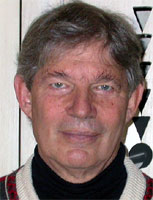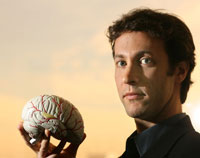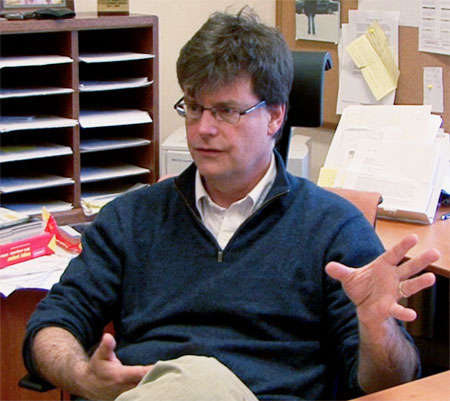
For the past twelve years my research team has been using all the brain research tools at its disposal, from functional MRI to electro- and magneto-encephalography and even electrodes inserted deep in the human brain, to shed light on the brain mechanisms of consciousness.
I am now happy to report that we have acquired a good working hypothesis. In experiment after experiment, we have seen the same signatures of consciousness: physiological markers that all, simultaneously, show a massive change when a person reports becoming aware of a piece of information (say a word, a digit or a sound).
STANISLAS DEHAENE is a Professor at the Collège de France and Chair of Experimental Cognitive Psychology. His research focuses on the cerebral bases of specifically human cognitive functions such as language, calculation, and reasoning. His work centers on the cognitive neuropsychology of language and reading, and his main scientific contributions include the study of the organization of the cerebral system for number processing. He is the author of The Number Sense: How Mathematical Knowledge Is Embedded In Our Brains; and Reading in the Brain the Science and Evolution of a Cultural Invention. Stanislas Dehaene's Edge Bio Page
THE REALITY CLUB: Daniel Kahneman, Sam Harris, George Dyson, Steven Pinker, Donald Hoffman, Arnold Trehub
Introduction by
John Brockman
On October 17, Edge organized a Reality Club meeting at The Hotel Ritz in Paris to allow neuroscientist Stanislas Dehaene to present his new theory on how consciousness arises in the brain to a group of Parisian scientists and thinkers. The theory, based on Dehaene's past twelve years of brain-imaging research is called the global neuronal workspace. It promises to offer new tools for diagnosing consciousness disorders in patients.
"For the past twelve years," says Dehaene, "my research team has been using every available brain research tool, from functional MRI to electro- and magneto-encephalography and even electrodes inserted deep in the human brain, to shed light on the brain mechanisms of consciousness. I am now happy to report that we have acquired a good working hypothesis. In experiment after experiment, we have seen the same signatures of consciousness: physiological markers that all, simultaneously, show a massive change when a person reports becoming aware of a piece of information (say a word, a digit or a sound).
"Furthermore, when we render the same information non-conscious or "subliminal," all the signatures disappear. We have a theory about why these signatures occur, called the global neuronal workspace theory. Realistic computer simulations of neurons reproduce our main experimental findings: when the information processed exceeds a threshold for large-scale communication across many brain areas, the network ignites into a large-scale synchronous state, and all our signatures suddenly appear.
But this is already more than a theory. We are now applying our ideas to non-communicating patients in coma, vegetative state, or locked-in syndromes. The test that we have designed with Tristan Bekinschtein, Lionel Naccache, and Laurent Cohen, based on our past experiments and theory, seems to reliably sort out which patients retain some residual conscious life and which do not.
"My laboratory is now pursuing this research intensively on patients, animals, human adults and young children, with the hope of turning our brain-imaging measurements into a real-time monitor of conscious experience. The time thus seems ripe to share this work with a broader audience of readers interested in cutting-edge science and technology, but also those concerned with the philosophical, personal and ethical implications of these findings."

Participating in the event and joining the Edge dinner that followed were:
Noga Arikha, Historian of ideas; Author, Passions and Tempers: A History of the Humours
Patrick Cavanagh, University of Paris researcher on visual perception and its implications
Laurent Cohen, Neurologist, Hôpital de la Salpêtrière (Paris); Author, L'homme thermomètre (Thermometer Man), a science-based single-case study similar to the work of Oliver Sachs
Emmanuel Dupoux, Director of Laboratoire de Sciences Cognitives et Psycholinguistique (LSCP)
Ghislaine Dehaene-Lambertz, CNRS, Neuro-paediatrician and researcher studying infant brain development
Janine di Giovanni, Journalist; Vanity Fair and The New York Times
Juan Enriquez, Life Sciences investor and Academic; Author, As the Future Catches Us
Etienne Klein, Physicist; Author of many books on epistemology and history of science
Katinka Matson, Cofounder, Edge
Lionel Naccache, Neurologist; Author, Le Nouvel Inconscient, (The New Unconscious), which establishes a new science-based dialog between research on non-conscious processing and Freudian view
Gloria Origgi, Philosopher and Researcher, Centre Nationale de la Recherche Scientifique
Sharon Pepperkamp, Linguist, University of Paris; Researcher, Laboratoire de Sciences Cognitives et Psycholinguistique
Philip Pettit, Philosopher, Professor of Politics and Human Values at Princeton; Author, Made with Words: Hobbes on Mind, Society and Politics
Jaqui Safra, Investor, (Encyclopædia Britannica, Spring Mountain Vineyards); Movie Producer
Dan Sperber, Directeur de Recherche au CNRS, Paris, Social and Cognitive scientist; Author,Rethinking Symbolism; On Anthropological Knowledge; Explaining Culture
Aalam Wassef, Digital Artist, Music Composer, Network Designer
— JB

[1hr 20 minutes]









